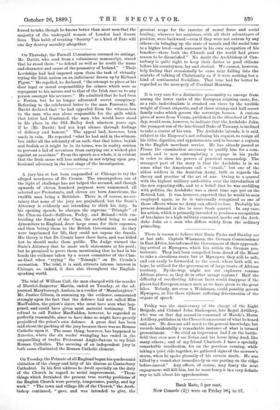On Thursday, the Parnell Commission resumed its sittings. Mr. Davitt,
who read from a voluminous manuscript, stated that he stood there "to defend as well as he could the name and character and cause of the peasantry of Ireland." " Their Lordships had had imposed upon them the task of virtually trying the Irish nation on an indictment drawn up by Richard Pigott." He repelled, he declared, " the attempt to place at his door legal or moral responsibility for crimes which were as repugnant to his natuYe and to that of the Irish race as to any person amongst his accusers." He admitted that he had been a Fenian, but he no longer advocated secret conspiracy. Referring to the celebrated letter to the man Forrester, Mr. Davitt declared that " he had appealed from the witness-box to the man who was alone responsible for the guilt which that letter had frustrated, the man who would have stood in his place in the Old Bailey dock nineteen years ago, if he (Mr. Davitt) had not kept silence through feelings of delicacy and honour." The appeal had, however, been made in vain. He repeated "what he had said in the witness- box under all the solemnity of an oath, that that letter, boyish and foolish as it might be in its terms, was in reality written to prevent a lad of seventeen from carrying out a wicked plot against an associate." From the speech as a whole, it is evident that the Irish cause will lose nothing in not relying upon pro- fessional advocacy in the last stage of the investigation.






































 Previous page
Previous page